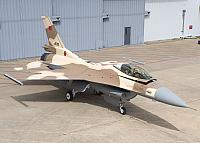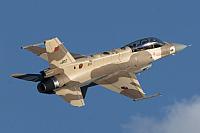Fighter Jet News
F-16 Fighting Falcon News
First Moroccan F-16 pilots to complete training in Arizona
June 27, 2011 (by
Maj. Gabe Johnson) -
In July, the Kingdom of Morocco, a strategic partner for U.S. forces in North Africa, will become the 25th country to own and operate F-16 Fighting Falcons. The pilots tapped to fly them are scheduled to finish training in time to bring them home, July 30.

Four Royal Moroccan Air Force officers, former F-5 pilots, will conclude 15 months of rigorous instruction at the 162nd Fighter Wing; the international F-16 training unit at Tucson International Airport.
They are the first from their country to accomplish consecutive courses in basic qualification, flight lead upgrade and instructor pilot certification in the multi-role fighter.
A handful of Air National Guard pilots will accompany them as they deliver the first four of Morocco's 24-aircraft purchase. The new planes, block 52 versions of the fighter, will be fresh off the assembly line and are a considerable step up in technology from the third generation fighters Morocco currently flies.
"We are modernizing our fleet and we've chosen the F-16, not only because it is a high-quality airplane, but also because of the close relationship we have with the United States," said Deputy Inspector of the Royal Moroccan Air Force, Brig. Gen. Abdelali Houari.
"We are really happy to send our pilots here to be trained. After a year and a half in the United States our pilots are happy, of course they want to return home, but they have gained a lot of experience here with the Arizona Air National Guard."
Lt. Col. Steve Haase, the Morocco program manager for the 162nd, worked with the RMAF for the last three years. He's trained fighter pilots from all over the world and fully understands the scope of the students' historic accomplishment.
"It's all them," he said. "It's a big commitment to be the first F-16 pilots for Morocco. It's a testament to their positive attitude and work ethic. They are excited about the F-16 and its capabilities yet they understand how much work there will be to build up an F-16 base."
As students, the pilots averaged three sorties per week and accumulated more than 150 F-16 hours each. Once home, they will not only be responsible for training others, but will also be instrumental in standing up F-16 operations at Ben Guerir Air Base.
It's a former U.S. air base located about 36 miles north of Marrakech and once served as a transatlantic abort landing site for the space shuttle. It's currently undergoing upgrades that, according to Moroccan officials, are modeled after U.S. Air Force bases.
"These are the best F-5 instructor pilots from their air force. They think the way we think," Colonel Haase said. "They have really shown that they want to learn how we [the U.S.] operate with the F-16 so they can do it the same way - not just flying, but everything from maintenance to logistics."
Six additional Moroccan pilots are currently in the basic F-16 course in Tucson with graduation planned for September. They too will return home to help manage Morocco's growing F-16 fleet.
It's unclear if more student pilots from Morocco will train in Tucson; however, according to Colonel Haase, the 162nd stands ready.
"Every country is very different, that's what's so fascinating for instructor pilots here," said the colonel. "We get to know these guys on a personal level and establish trust with them. Training capable fighter pilots and fostering relationships along the way is what this is all about."
Since 1989, the 162nd has trained with virtually every nation that flies the F-16. In addition to Morocco, the wing currently trains with pilots from Singapore, Norway, Belgium, Chile, the Republic of Korea, and the Netherlands.

RMAF Maj. Mouloud Chihani performs a preflight check on an F-16 at Tucson IAP before a training mission on July 7th, 2010. Chihani and three other Moroccan pilots are the first F-16 pilots in their air force and will lead the way to establish a new squadron of block 52s when they return home this July. [USAF photo by MSgt. Jack Braden]
They are the first from their country to accomplish consecutive courses in basic qualification, flight lead upgrade and instructor pilot certification in the multi-role fighter.
A handful of Air National Guard pilots will accompany them as they deliver the first four of Morocco's 24-aircraft purchase. The new planes, block 52 versions of the fighter, will be fresh off the assembly line and are a considerable step up in technology from the third generation fighters Morocco currently flies.
"We are modernizing our fleet and we've chosen the F-16, not only because it is a high-quality airplane, but also because of the close relationship we have with the United States," said Deputy Inspector of the Royal Moroccan Air Force, Brig. Gen. Abdelali Houari.
"We are really happy to send our pilots here to be trained. After a year and a half in the United States our pilots are happy, of course they want to return home, but they have gained a lot of experience here with the Arizona Air National Guard."
Lt. Col. Steve Haase, the Morocco program manager for the 162nd, worked with the RMAF for the last three years. He's trained fighter pilots from all over the world and fully understands the scope of the students' historic accomplishment.
"It's all them," he said. "It's a big commitment to be the first F-16 pilots for Morocco. It's a testament to their positive attitude and work ethic. They are excited about the F-16 and its capabilities yet they understand how much work there will be to build up an F-16 base."
As students, the pilots averaged three sorties per week and accumulated more than 150 F-16 hours each. Once home, they will not only be responsible for training others, but will also be instrumental in standing up F-16 operations at Ben Guerir Air Base.
It's a former U.S. air base located about 36 miles north of Marrakech and once served as a transatlantic abort landing site for the space shuttle. It's currently undergoing upgrades that, according to Moroccan officials, are modeled after U.S. Air Force bases.
"These are the best F-5 instructor pilots from their air force. They think the way we think," Colonel Haase said. "They have really shown that they want to learn how we [the U.S.] operate with the F-16 so they can do it the same way - not just flying, but everything from maintenance to logistics."
Six additional Moroccan pilots are currently in the basic F-16 course in Tucson with graduation planned for September. They too will return home to help manage Morocco's growing F-16 fleet.
It's unclear if more student pilots from Morocco will train in Tucson; however, according to Colonel Haase, the 162nd stands ready.
"Every country is very different, that's what's so fascinating for instructor pilots here," said the colonel. "We get to know these guys on a personal level and establish trust with them. Training capable fighter pilots and fostering relationships along the way is what this is all about."
Since 1989, the 162nd has trained with virtually every nation that flies the F-16. In addition to Morocco, the wing currently trains with pilots from Singapore, Norway, Belgium, Chile, the Republic of Korea, and the Netherlands.
Courtesy of 162nd Fighter Wing Public Affairs
Additional images:


The first Moroccan F-16C block 52 #08-8001, seen here on September 21st, 2010, is scheduled to fly in the fall of 2010. Morocco, the 25th nation to operate the F-16, ordered twenty-four block 52 aircraft in 2009. The two-tone light brown scheme with grey underside is unique to the Moroccan Air Force. [Lockheed Martin photo by Randy Crites]
Related articles:
Forum discussion:
Tags
- Lockheed Martin wins $841.9M deal for Moroccan F-16s (2009-12-23)
- RMAF F-16s to get Sniper target pods (2009-09-25)
- Morocco requests Support Equipment & Weapons (2009-09-09)
- Luke Airmen advise Moroccan air force on F-16 base operations (2009-03-21)
- F-16 Fighting Falcon news archive
Forum discussion:
- Start a discussion about this article in the F-16.net forum.
Tags

